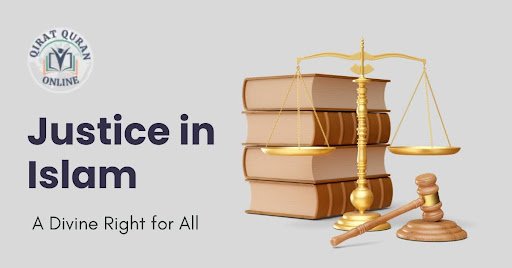What does justice mean to you? For Muslims, justice extends beyond the boundaries of personal views or social constructs; it is a command from above. Islam is a way of life, and justice, in particular, is one of its core principles, encompassing elements of equity, equality, and deep moral obligation. It is more than systematized socially or legally, but rather a framework based on Divine wisdom and revelation.
To appreciate justice in Islam is not merely to be aware of the laws set forth, but to possess a deep sense of balance and equity within one’s existence. In this post, I will focus on how justice is defined in Islam, verified in the Holy Quran and the Sunnah of Prophet Muhammad (PBUH), and how it can be applied today.
What is Justice in Islam?
Islamic justice refers to giving each person their due rights and balanced treatment that corresponds to their responsibility within the framework of God’s directives.
Definition and Core Principles of Justice
Justice in Islam, or Al-Adl in Arabic, refers to ensuring the giving of rights to those who deserve them. It involves placing everything as it ought to be and maintaining equity at all costs, which is not confined to legal frameworks but also extends to personal, social, economic, and moral aspects.
Some of the basic tenets of justice in Islam include the following:
- Equality: Using all features like race, gender, and even status to disregard class differences and treat people as equals.
- Truthfulness: Upholding, spreading the truth, and shunning falsehood or deceit at all costs.
- Responsibility: Self-accountability for personal actions taken that stand to benefit other people.
Just as Islam did not encourage blind obedience to authority, abuse of power is also not tolerated. The Prophet Muhammad, peace be with him, said, “The just leader will be closest to Allah on the day of judgment”, highlighting the importance of justice not only as a responsibility but necessitating resorting to come close to God.
The Concept of Fairness and Equality in Islam
The fairness of one is the backbone of justice in Islam. Surah An-Nisa (4:58) states, “Indeed, Allah commands you to render trusts to whom they are due and to judge with justice when you judge between people…” In this instance, fairness is accentuated as a command that Muslims are to follow in all aspects of life.
The equality of all people is further stressed. Prophet Muhammad (peace be upon him) stated in his farewell that, “All mankind is from Adam and Eve… An Arab has no superiority over a non-Arab, nor does a non Arab have superiority over an Arab; a white person has no superiority over a black person, nor does a black person have superiority over a white person—except by piety and good action.”
Justice in the Qur’an: Divine Guidance
Striving for any form of fairness within life’s scope has been deeply inscribed in the Qur’an’s structure. It is stated that the balance system in life serves as its holistic cosmography concept and body divinely, inferring that fairness is not achievable single-handedly.
Key Verses on Justice
The concept of fairness or justice is stressed repeatedly throughout the Qur’an and regarded as a core divine role. In Surah Al-Ma’idah (5:8), Allah says, “O you who have believed, be persistently standing firm for Allah, witnesses in justice, and do not let the hatred of a people prevent you from being just. Be just; that is nearer to righteousness.”
As for trust and self-imposed responsibility. Surah Ash-Shura (42:15) makes a command, “And I have been commanded to be just among you. Allah is our Lord and your Lord.”
How the Qur’an Defines Justice as a Divine Right
When we speak of the core Islamic values, none stands out as strongly as justice. It is one of the most powerful principles deeply rooted in the Qur’an and Sunnah. Justice is a foundation upon which civilizations flourish, ensuring that truth prevails without bias or favoritism. The Qur’an commands all believers to uphold justice, even if it goes against their own interests or blood relations, emphasizing that no one is above the law. This divine principle safeguards communities and promotes equality among all people. To learn Quranic teachings on justice and gain a deeper understanding of Islamic values, explore authentic courses and spiritual guidance through Al Huda Quran Academy.
The Role of Prophet Muhammad (peace be upon him) in Promoting Justice
Justice, as shown in the life of Muhammad (peace be upon him), was reflected in his actions, pronouncements, and practices. He exemplified and maintained the highest standards of justice.
Teachings of the Prophet Muhammad on Justice
The holy Qur’an refers to him as a “Mercy to the worlds” (Surah Al-Anbiya, 21:107). He did not wander from justice, and compassion marks were present in his rule and system.
He is noted for many sayings, but one of the most famous ones remains, “Allah does not show mercy to the one who is not merciful to the people” (Bukhari, Muslim).
Examples from the Life of the Prophet
He has lived a lot of years. Countless examples can be illustrated from the life of Muhammad (peace be upon him). Most prominently, remembering a theft incident of a noble lady of the Makhzum dynasty. Despite being from a high society, the woman was a thief, which the Prophet (peace be upon him) did not overlook. “By Allah, if Fatimah, the daughter of Muhammad, were to steal, I would have her hand cut off” (Bukhari, Muslim).
We can say that Islam defends the rights of the poor who have been wronged and does not compromise justice. In Islam, so as not to aggravate the situation, there is no pardon given, as privileges like social status and power are discarded.
The Five Pillars of Islam and Their Connection to Justice
The Five Pillars of Islam create a system of balance, equity, and ethical integrity on both individual and societal levels.
How Each Pillar Promotes Fairness and Equity
The Five Pillars of Islam form the foundation of justice and ethical conduct:
- Shahada (Faith): All believers as Servants of Allah are treated equally, hence reinforcing uniformity.
- Salah (Prayer): Inculcates discipline, respect, and the ability to follow a timetable.
- Zakat (Charity): Works to cure economic disparities by providing aid through wealth redistribution.
- Sawm (Fasting): Develops the ability to control oneself and understanding of the hopeless.
- Hajj (Pilgrimage): Commands equal treatment amongst Muslims as all put on plain white pieces of cloth irrespective of social class.
Social Justice in Islam
The Islamic system ensures social justice by paying particular concern to issues of equity, empathy, and compassion within the community.
Protecting the Weak and Vulnerable in Society
Social justice in Islam gives primary concern to the care of the disabled, the weak, and the marginalized. Muslims are encouraged to be champions of social justice and look after the vulnerable, as it is commanded in Surah An-Nisa (4:75): “And what is [the matter] with you that you fight not in the cause of Allah and for the oppressed among men, women, and children…?”
Islam’s Stance on Poverty, Wealth, and Equality
Islam regards wealth as a trust given by Allah. It is not permissible to keep wealth without** aiding those in need.** With Zakat, mandatory charity, and the prohibition of interest (riba), Islam ensures that wealth is not concentrated in a few hands and exploited.
Sharia Law and Justice
The consideration of Sharia law highlights equity, individual rights, and justice all at the same time.
Explanation of Sharia Law in the Context of Justice
Sharia law has been largely misinterpreted, as it actively strives for social equity for the citizens, which includes the protection of life, religion, intellect, property, and lineage. It performs statutory trials, guarantees the rights of people, and maintains harmony in the state.
Ensuring Justice for All
Sharia provides for justice as, in the first instance, it states individual rights along with the collective good within the society. As an illustration, it provides for equal and justifiable punishment and fosters forgiveness and peace in other areas.
Justice and Mercy in Islam: Finding the Balance
An unpunished society is a society partitioned within itself, and Sharia law seeks to uphold justice through balance and compassion.
The Importance of Forgiveness and Compassion
Islam teaches that every act of justice is accompanied by an act of mercy. Mercy to Muslims comes in the form of Ar-Rahman (The Most Merciful) and Al-Adl (The Most Just). Muslims are urged to extend mercy towards each other as captured in the Quran (42:40) “…But if you pardon and overlook and forgive, then indeed, Allah is Forgiving and Merciful.”
Islamic Justice in Modern Society
Islamic justice is concerned with the harmony of the balance of fairness, compassion, and accountability within society.
Application of Principles Today
Justice in Islam is up to date and takes into consideration such matters as the disparity of wealth, systematic injustice, and discrimination towards nature. The Islamic principle of justice is defined by corporations practicing social responsibility, governments having just social policies, and people advocating for justice.
The Relevance of Islamic Justice in the Modern World
Justice in Islam is boundless and invites universal acceptance because it eliminates discrimination based on race, gender, and class. It provides a foundation for both inclusion and equity in an ever-diversified world, which is its beauty
Justice is the Right of All
In Islam, justice is not simply a notion; it is a God given right to everyone.
It promotes soundness among individuals, societies, and countries. As taught in the Qur’an, Muhammad’s life, and the five pillars of Islam, justice takes precedence over all else in both religiosity and welfare.
Are you a student, researcher, or an individual wishing to gain further insight regarding Islam and Islamic justice? Do not hesitate to post your opinions or your inquiries below and become part of a passionate community designed to facilitate the discussion of these ancient principles.
Frequently Asked Questions (FAQs)
- What is the importance of justice in Islam?
Islam in general guarantees the protection of an individual’s rights. Protecting individuals’ rights and guaranteeing the functioning of a just and balanced society is essential in Islam. That is why Justice is issued in a divine command that every Muslim is to observe. - How does Islam define justice?
Islam describes Justice in their terms as: Balance, fairness, and righteousness. This means that everyone is treated with respect and not to cause their suffering or injustice. - What role does the Qur’an play in Islamic justice?
The Qur’an contains instructions on justice which provide a foundation for it, through verses which appeal to fairness, equality, and the rights of human beings involved.
- Can mercy coexist with justice in Islam?
Yes, Islam upholds that mercy and justice go side by side. While justice is about maintaining balance, it goes hand in hand with mercy, compassion, and forgiveness.
How can the principles of justice in Islam be applied today?
Social justice in Islam can be achieved through ensuring equity, safeguarding fundamental rights, and resolving contemporary challenges such as socioeconomic class imbalances and social discrimination.

